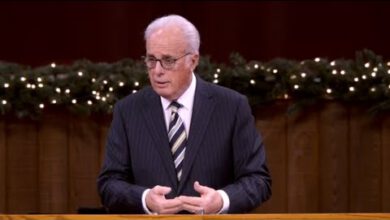John MacArthur: Who Is Jesus?
John MacArthur: Who Is Jesus?
I was asked to speak on the topic, “Who is Jesus?” While this might seem like a basic question to many, it remains one that many people struggle to answer. Some of you may have recently heard of Scientology, a pseudoreligion that has gained attention. Scientology, which many of you may have encountered through celebrity figures like Tom Cruise, was created by L. Ron Hubbard, a science fiction writer and medium.
Hubbard attempted to answer the question, “Who is Jesus?” by claiming that Jesus never existed as a person, but instead was an electronic idea implanted in someone’s mind around 600 B.C. He stated that this concept, called R-6, occurred while this individual was between incarnations, during a moment when they were observing a madman. According to Hubbard, Jesus was simply a mystical, electronic biological implant with disturbing characteristics.
This perspective is not only bizarre but also blasphemous. If you reject the true Christ, you can create any version of Christ you like, but in the end, you’ll end up in the same dangerous place. Believing in any other interpretation of Christ—other than the true one—leads to spiritual ruin. This is why the accurate understanding of Jesus Christ is crucial for salvation. As the Bible says, “If anyone preaches another Christ, let him be cursed.”
Even being close to the right answer, yet missing it, can have eternal consequences. To understand this better, let’s look at a pivotal moment in the life of Jesus in the Gospel of Luke. Turn to Luke 20:41-47.
In this passage, Jesus questions the belief that the Christ is merely David’s son. He references Psalm 110, where David calls the Messiah “Lord,” asking how the Messiah could both be David’s son and his Lord. As Jesus speaks to the people, He warns them about the scribes—religious leaders who seek honor, but exploit the poor for personal gain. He contrasts this with the humility of a poor widow who, despite her poverty, gave all that she had to the offering.
As some admired the temple, Jesus prophesied its destruction, saying that one day not a single stone would remain upon another. This moment in Jesus’ ministry highlights the importance of understanding who He truly is. Today, many may believe that simply getting some things right in life, or holding certain values, is enough to secure salvation. Some argue that as long as you believe in the one true God—especially the God of Abraham, Isaac, and Jacob—you’re on the right path. But this is a misunderstanding of the Gospel.
Jesus makes it clear that rejecting Him is not a minor error. For those who misinterpret or ignore His true nature, there is no lesser condemnation—only greater condemnation. Jesus challenges all of us to understand and accept who He truly is because the right belief in Him is the only path to salvation.
